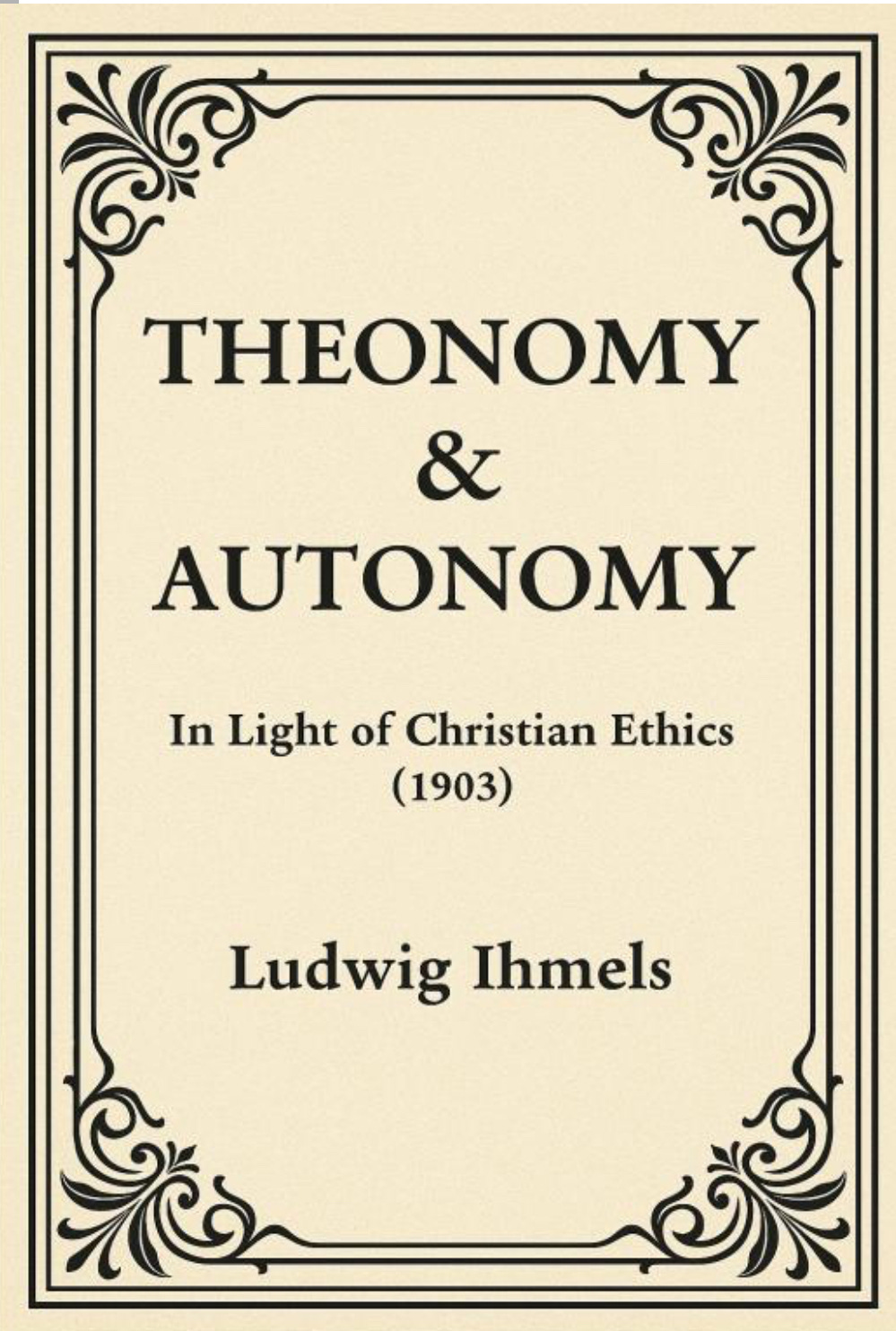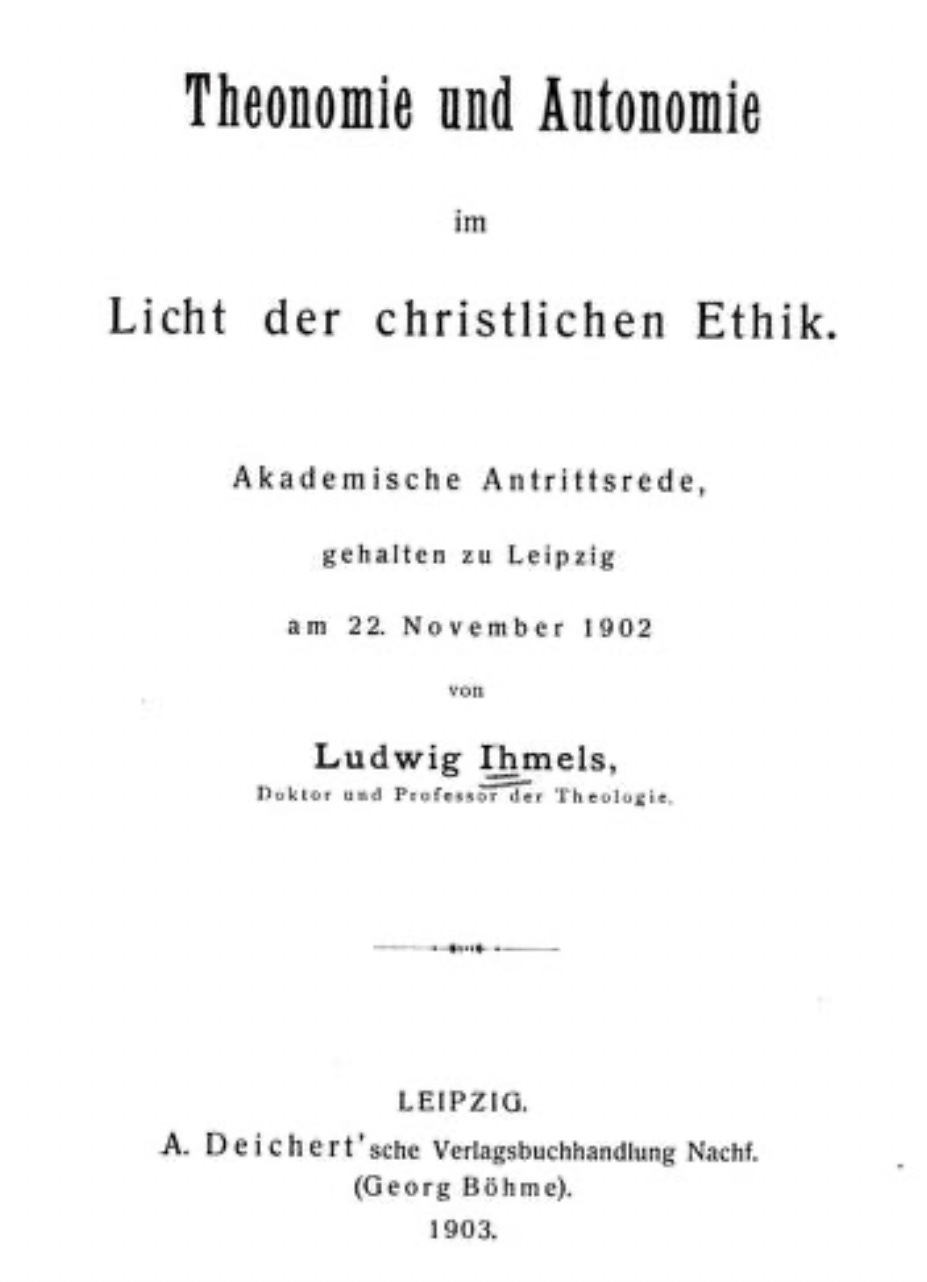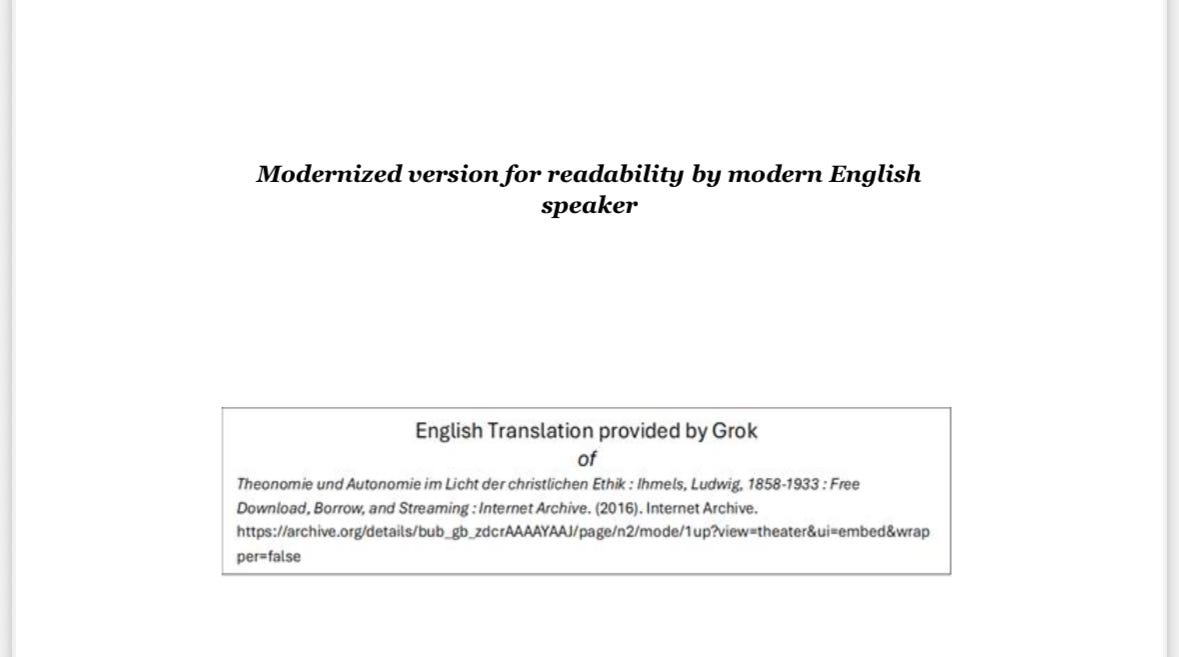Was “Theonomy” invented in the mid-20th century?
And does the discussion find its origins within the Reformed tradition?
Was “Theonomy” invented in the mid-20th century? Does the discussion find its origins within the Reformed tradition?
The short answer to both questions is no. Despite claims that the “theonomy vs autonomy” discussion is a novelty that arose within dark corners of certain reformed circles during the middle of the twentieth century, I recently discovered the discussion happening decades earlier within German Lutheranism.
I have run the public domain publication through AI and created a modernized English version for interested parties.
Preface
By publishing this lecture, I respond to suggestions from various sources. This also aligns with the established custom for such lectures. I hope the subject itself holds general interest. May my elaborations contribute to satisfying this interest!
The Author
Introduction
I am called to advance systematic theology at this university. I wish to inaugurate this role with a public lecture on ethics. This needs no justification at an institution where ethics is a fine tradition within the theological faculty.
My choice of topic stems from my lecture cycle, which begins with ethics. This focus naturally directed my thoughts to this central issue. However, I also wanted a topic I could address successfully in the given time. It should allow a programmatic approach, as expected from such a lecture.
Today, anyone taking a new academic post in systematic theology feels a strong need to reassess past practices. They also question theology’s place among faculty disciplines. We don’t need to dwell on the many voices raising these points. These voices need not be hostile to be significant.
Many fully acknowledge Christianity’s historical importance for ethics. They are ready to learn from it in specific ways. However, they wish to learn from Christian ethics selectively. They decide for themselves to what extent it holds validity.
Christianity claims to proclaim a moral ideal of absolute validity and value in God’s name. This claim cannot be accepted by all. Grounding morality in God’s command is seen as a limitation. It prevents Christian ethics from being the final stage of morality.
Instead, morality in its purest form comes from its own internal laws. In other words, autonomy is favored over theonomy. This poses key questions for the Christian theologian. Does the demand for autonomy reflect an interest Christian ethics must acknowledge? Must this interest lead to abandoning theonomy? Or are autonomy and theonomy not absolute opposites in every respect?
Clarifying the Central Issue
To clarify these questions, we must first show this is the decisive point. General ethical science often aligns with Christian ethics in some ways. The shift from eudaimonistic premises to evolutionary ethics is not accidental. It occurs with inherent necessity.
I hope for a further triumph of insight. No exact scientific research can truly determine humanity’s ultimate goal. Only religion dares to interpret this goal. What decides whether an ethicist accepts this goal from religion?
This question may seem foolish and uncomfortable. We stand where scientific discussion ends. Personal decision takes over. The theologian is least likely to overlook this. I don’t mean to ignore this reality. I only reflect on what hinders adopting Christianity’s developmental ideal into ethics.
Addressing the Transcendence Objection
Is it the transcendence of this ultimate goal? For many, a solely transcendent goal seems unhelpful for today’s moral tasks. However, evangelical ethics avoids this concern. For it, the kingdom of God’s community, the highest good, comes from heaven. Yet it has entered human development.
Evangelical ethics understands Jesus’ demand. This kingdom must permeate all life like leaven. The community of God proves itself in daily relationships. The kingdom at history’s end is the fulfillment of what we have now.
Realizing the present kingdom in history is a powerful cultural mission. The day will show nothing essential is lost from humanity’s goals. Christianity’s understanding of human development poses a moral task. It is broad enough to encompass all essential goals. It is also simple enough for both the intellectually elevated and humble to participate.
Refuting the Eudaimonism Misunderstanding
This clarity addresses another misunderstanding. Some think a purely transcendent highest good introduces eudaimonism into Christian ethics. Certain religions, and some Christian views, link blessedness to morality through reward.
Evangelical ethics acknowledges the pedagogical value of this link in Jesus’ teachings. However, it insists this doesn’t exhaust the matter. Blessedness is not a reward for morality. It presupposes communion with God as already present.
These points show how unfruitful it is to debate the religious foundation of ethics broadly. The contradiction lies in not posing the question from Christian ethics’ perspective. Or it stems from misunderstanding genuine Christianity.
Theonomy vs. Autonomy: The Decisive Tension
The decisive point is different. Christianity commits to theonomy. Yet the demand for autonomy seeks an interest Christian ethics also acknowledges. These concerns gain attention for the Christian theologian. They are emphasized by a philosophical ethics the theologian often sympathizes with.
It’s no accident that recent theological ethics presentations connect with Kant. They emphasize the unconditional “ought” as a fundamental moral datum. The moral demand confronts us with a categorical imperative’s force. It claims us entirely.
The good is an absolute value concept. Any utilitarian dilution must be rejected. Here, “utilitarian” means the good being good for something else. These are elementary Christian truths that must not be abandoned.
The Christian theologian can listen impartially to Kant’s conclusions. Kant believed his demand for moral autonomy captured genuine Christianity’s essence. He sought to show practical reason’s self-legislation could be seen as divine command. Does this not bridge theonomy and autonomy, as we asked at the start?
Evaluating Kant’s Approach
Kant’s specific combination of theonomy and autonomy may not convince everyone. Kant opposes eudaimonistic ethics. He rejects a theonomous grounding of morality. Yet he links virtue with happiness as the highest good. He postulates God as its guarantor. This affects both religion and morality negatively.
Little honor is done to religion when it pays out morality’s reward. Morality veers toward eudaimonism when balancing virtue and external happiness. However, Kant offers hints of a more skillful combination. Judging this possibility should remain independent of Kant’s specific elaboration.
All such attempts must be rejected. They lead to the notion that divine command gains sanction only from human self-legislation. This reverses Christianity’s view. The moral demand derives its absolute character from divine authority alone.
Addressing the Eudaimonism Critique of Theonomy
Does this expose ethics to eudaimonism, as Kant described? This is the first concern for theonomous ethics. Critics claim it must take a eudaimonistic character. This seems convincing at first. Moral action is safeguarded against impure motives when it expresses one’s own will.
If a person allows morality to be imposed externally, the motive seems tied to the moral effort’s outcome. Thus, the effort ceases to be morally valuable. Theonomous ethics seems no exception. What motivates submission to divine law if not God-guaranteed blessedness?
This conclusion holds if God is just another personality among others. How another’s will could determine mine, except through the good it offers, is unclear. We must not confuse this with another fact. An external demand can become my will’s determinant by legitimizing itself before my moral consciousness.
At that moment, it ceases to be external. It becomes my own will’s expression. However, we rejected that divine command must legitimize itself before human moral consciousness. What else motivates compliance if not the good it offers?
Christian Experience of Theonomy
Before theoretical discussion, let’s ask how the moral demand takes hold in a Christian. For the simple Christian, untroubled by theory, sanctioning God’s command as divine feels blasphemous. The moral demand doesn’t ask for respect. It asserts itself against their will at key points.
The notion that reflecting on the offered good awakens the decision to affirm the moral demand doesn’t match their experience. That reflection would see the demand as a means to that good. Instead, their experience involves ceasing all reflection.
The Christian doesn’t experience God as a moral will among others. Even if God were the highest, it would still require deciding to acknowledge the demand. God is the unconditional will. He demands the person entirely for Himself, without regard for other purposes.
In theonomy, the Christian experiences the unconditionality of the “ought” Kant identified as moral. This interpretation safeguards the moral demand’s unconditional character against eudaimonistic distortion.
Autonomy’s Risk of Heteronomy
Recent philosophical and theological assessments agree. Absolute autonomy leads to heteronomy. If autonomy meant the right to determine oneself arbitrarily, it would mean being at the mercy of any interest. Self-legislation only has meaning if my will’s maxim can serve as universal legislation’s principle.
In other words, the human will follows its own law only if bound to norms beyond human origin. How can this binding be interpreted except as binding to God? One either notes that humans know themselves bound to an unconditional “ought.” Or, to explain this, one finds it in experiencing this binding as an unconditional personal will’s effect.
The possibility of evading the “ought” for some good ceases where humans know they belong to God unconditionally. However, the divine demand must impose itself as absolutely valuable. It must prevail over differently oriented inclinations.
The Psychological Necessity of Value
This is a psychological necessity. It has nothing to do with theonomy or autonomy. Kant knew this practical interest in the moral act was indispensable. He opposed the pathological interest in the act’s outcome.
Where interest in the outcome, detached from the act, motivates moral action, it becomes corrupted. This clarifies eudaimonism’s error and truth. Its error lies in claiming the good is pursued for its achieved good. Its truth lies in the moral demand being experienced as the highest good.
Every ethicist must describe the moral demand as a highest good. This applies to both autonomy and theonomy. The question is: How can devotion to God, seeming to renounce human value, be experienced as absolutely valuable?
This question rephrases another: How is God’s demand understood as God’s without legitimizing itself before human morality? These hinge on a presupposition. Humans are oriented toward God, so only in devotion to Him does their personality find fulfillment.
In this orientation, humans perceive God’s unconditional demand as His voice. In losing themselves to God, they find themselves (Matt. 10:39). This addresses the second objection against theonomy.
The Moral Beyond Duty
Morality is not fully described by the consciousness of an unconditional “ought.” This holds even if moral judgment concerns only individual actions. Ethics imposes another requirement on actions beyond duty wrested against inclinations.
This formal description becomes inadequate. Moral judgment isn’t primarily about individual actions. It first asks about the entire life’s work, where human intention is directed. We reach a standard by giving content to the moral’s formal description through its highest purpose.
Kant’s expositions suggest this combination from various angles. He didn’t carry it out where he emphasized the human person’s unconditional self-purpose. Nor did he make the kingdom of ends concept fruitful for morality. He believed any purpose taints moral action.
However, this applies only to purposes outside the personality’s self-purpose. These can become our will’s aim only through interest in them. What prevents combining the unconditionality’s “ought” with realizing the highest purpose immanent to human nature?
Both ideas complement each other. Only through their combination is morality fully realized. Moral action is morally valuable only when directed toward this immanent purpose. Humans must be conscious of an unconditional “ought.”
Autonomy’s Role in Personal Authenticity
This casts autonomy in a new light. It secures the moral action’s personal distinctiveness and inner truth. Moral action aims for the realization of human nature’s purpose as such. This confirms humans must strive for universal validity in moral action.
Every human can realize human nature only within their personality’s limits. They do so according to their talents and life’s concrete situation. Each can only become something. But they are responsible for becoming something whole, for being themselves wholly.
Each must choose their moral goals. They must set their moral task. They must determine themselves in individual actions. In this sense, each must be their own lawgiver.
This concerns self-responsibility’s tremendous idea. No one should evade it. No one should let it be diminished. Rejecting authoritarian belief in religion corresponds to rejecting heteronomy in morality.
No one can prescribe what we believe. No authority sustains our faith for us. No one should prescribe what we do or refrain from doing. We must not hide behind any authority for our actions.
As humble people, we seek advice from others gladly. We are ready to learn from them. In the time of becoming, maturing under moral personalities’ guidance is natural. Yet, individuals become a moral person only by having courage.
They must, as Christians, allow God’s grace to be what they’re called to be. The idea of autonomy cannot be emphasized strongly enough. Does theonomy really oppose this autonomy?
Reconciling Theonomy and Autonomy
Paul’s confession offers a preliminary answer. He says humbly yet confidently: “With me it is a very small thing that I should be judged by you or by any human court. Indeed, I do not even judge myself. It is the Lord who judges me” (1 Cor. 4:3–4). If humans are oriented toward God, autonomy and theonomy are not opposites.
They highlight two perspectives on the same matter. They demand the same thing from different viewpoints. Our will is truly moral only as our self’s simple expression. For Christians, this means willing God.
God imposes His law on humans. In doing so, He calls the will toward realizing their nature’s law. The decisive misunderstanding lies here. God’s authority is seen as external, like other authorities, imposing arbitrary demands.
God’s demand claims the whole human being. It has nothing to do with individual prescriptions. This is misunderstood if God becomes a formal authority first. Then arbitrary content gains divine command’s significance for the Christian.
We couldn’t explain how God becomes the highest authority for Christians. It stems from the moral demand’s specific content. From this, humans hear their God’s voice. In submitting, they realize their nature’s law.
As Christians become what they are meant to be, God’s will no longer opposes them. Their will becomes one with God’s. Biblical ideas emphasize this strongly in our church.
The Christian, free in devotion to God, is free from the law. They become their own law, both “anomos” and “ennomos Christou” (1 Cor. 9:21). The confession emphasizes this so much it risks blurring natural and moral boundaries.
If Christians were fully renewed, they would act voluntarily without any law’s teaching, admonition, urging, or compulsion. They would do what God wills, as the sun, moon, and stars follow their course freely, according to God’s order (Formula of Concord, Article VI). This could hardly be expressed more strongly.
The moral has inner truth only as a spontaneous expression of human will itself. The second objection against theonomous morality’s grounding proves unfounded on Christian grounds.
Reversing the Question
Can autonomy truly secure its interest? Is it feasible? Two points are crucial. First, practical reason’s autonomy unlikely inspires confidence. Even among earnest moralists, moral ideals are determined in diverse ways.
No one should be surprised by this. As Kant knew, radical evil exists in humans. Moral knowledge is strongly conditioned by the will. Must not the question arise? Is the moral will’s lawgiving already distorted?
Kant linked autonomy with freedom. His conclusion, “You can, for you ought,” is famous. The Christian theologian sympathizes with it. It expresses that we uphold morality by believing in human freedom.
As an empirical judgment, however, it contradicts experience. One who knows radical evil understands the painful lament: “Wretched man that I am, who will deliver me?” Christianity doesn’t dismiss this with a forceful verdict.
It knows redemption from this “I cannot.” In faith in Jesus Christ, it points to the way the law that kills becomes a law of freedom. It transforms the “ought” into a “will.”
Conclusion
Christianity can fully do justice to the interest behind autonomy’s demand. The same question arises again. Is Paul right to call being bound to God freedom, and freedom from God bondage?
Everything hinges on this. Scientific discussion reaches its limit here. If humans can stand alone, autonomy follows naturally. They must be entirely what they are.
If, however, their personality is created to find fulfillment in God, then autonomy exists only within theonomy. Everything hinges on this personal decision.



